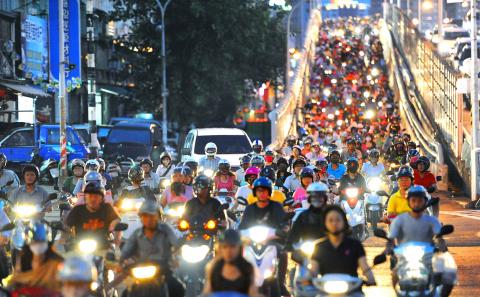More than 60 percent of Greater Kaohsiung residents use scooters, putting scooter use in the city not only higher than the national average, but also at the top of the list among the five special municipalities.
According to the latest statistics from the Directorate-General of Budget, Accounting and Statistics (DGBAS), nationwide scooter usage last year stood at 48.5 perrcent, but 61.9 percent of Greater Kaohsiung’s residents use scooters, ranking it the municipality with the highest scooter usage of all five special municipalities. It also means Kaohsiung is the only city where more than 60 percent of city’s population use scooters.
The DGBAS said the numbers were connected to the high density of scooters within Greater Kaohsiung, with 830 scooters for every 1,000 people. Greater Tainan comes in at second place with 775 scooters per 1,000 people. In Taipei, there are 415 scooters per 1,000 people, DGBAS statistics showed.

Photo: Chang Chung-yi, Taipei Times
DGBAS data show that Greater Kaohsiung broke the 750 scooter level in 2007 and went on to break the 800 mark in 2009.
The Ministry of Transportation and Communications suspects that, aside from a lack of public transportation in southern cities and counties contributing to the massive scooter proliferation rate, more sunny weather also plays a role.
The ministry also says that because the average income in southern Taiwan is lower than that of Taipei, riding a scooter is more cost-efficient than driving a car or using public transport.
Despite the efforts of the Greater Kaohsiung Government to promote public transportation, figures for public transportation use in the city stand at only 6.6 percent — only slightly higher than Greater Tainan’s 4.9 percent — and the city ranked fourth out of the five special municipalities.
However, the DGBAS data suggested that while Kaohsiung’s public transport usage figures were dismal, it was a slight increase compared with 2010 and this showed that the city government’s efforts are finally beginning to pay off.
Meanwhile, the data showed that 1,113 parking lots were taken up for every thousand cars in Greater Kaohsiung, meaning the city’s automobile usage rate is less than half that of Taipei and New Taipei City (新北市).
Greater Kaohsiung councilors have also made the high proliferation of scooters in the city one of their top priorities and in the first half of the year asked for the government to suggest proposals on how to reduce the number of scooters in the city.
Some city councilors have even suggested that the city government take a page from China’s book and stop authorizing scooter licenses on a general basis.
With an excess of scooter traffic comes the problem of illegal parking and in an effort to curb the practice the government has begun to set up scooter parking areas in traffic-heavy neighborhoods, such as Rueifung Night Market, Kaohsiung Train Station and the Shiinkuchan Commercial Zone (新崛江商圈).
The Greater Kaohsiung Government said it charges a standard fee for each scooter entering a parking area and so far scooter riders have accepted the charge. It added that it is asking its police force to step up efforts at handing out fines along with other punitive measures for illegal parking.

Taiwan is stepping up plans to create self-sufficient supply chains for combat drones and increase foreign orders from the US to counter China’s numerical superiority, a defense official said on Saturday. Commenting on condition of anonymity, the official said the nation’s armed forces are in agreement with US Admiral Samuel Paparo’s assessment that Taiwan’s military must be prepared to turn the nation’s waters into a “hellscape” for the Chinese People’s Liberation Army (PLA). Paparo, the commander of the US Indo-Pacific Command, reiterated the concept during a Congressional hearing in Washington on Wednesday. He first coined the term in a security conference last

A magnitude 4.3 earthquake struck eastern Taiwan's Hualien County at 8:31am today, according to the Central Weather Administration (CWA). The epicenter of the temblor was located in Hualien County, about 70.3 kilometers south southwest of Hualien County Hall, at a depth of 23.2km, according to the administration. There were no immediate reports of damage resulting from the quake. The earthquake's intensity, which gauges the actual effect of a temblor, was highest in Taitung County, where it measured 3 on Taiwan's 7-tier intensity scale. The quake also measured an intensity of 2 in Hualien and Nantou counties, the CWA said.

The Overseas Community Affairs Council (OCAC) yesterday announced a fundraising campaign to support survivors of the magnitude 7.7 earthquake that struck Myanmar on March 28, with two prayer events scheduled in Taipei and Taichung later this week. “While initial rescue operations have concluded [in Myanmar], many survivors are now facing increasingly difficult living conditions,” OCAC Minister Hsu Chia-ching (徐佳青) told a news conference in Taipei. The fundraising campaign, which runs through May 31, is focused on supporting the reconstruction of damaged overseas compatriot schools, assisting students from Myanmar in Taiwan, and providing essential items, such as drinking water, food and medical supplies,

New Party Deputy Secretary-General You Chih-pin (游智彬) this morning went to the National Immigration Agency (NIA) to “turn himself in” after being notified that he had failed to provide proof of having renounced his Chinese household registration. He was one of more than 10,000 naturalized Taiwanese citizens from China who were informed by the NIA that their Taiwanese citizenship might be revoked if they fail to provide the proof in three months, people familiar with the matter said. You said he has proof that he had renounced his Chinese household registration and demanded the NIA provide proof that he still had Chinese